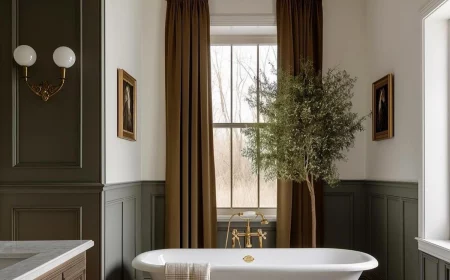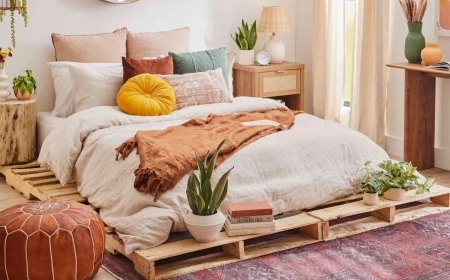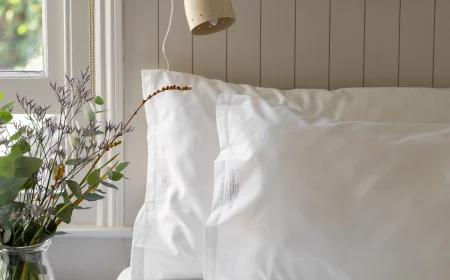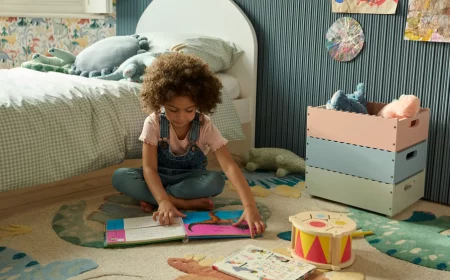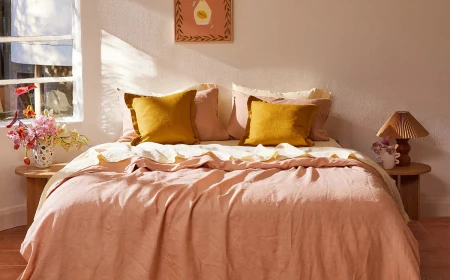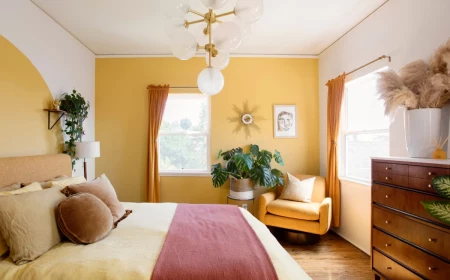Your Bedroom Isn’t Just a Room—It’s Your Recharge Station. Here’s How to Fix It.
I’ve seen it a thousand times. People come to me with photos of their bedrooms looking totally overwhelmed. The space is cluttered, chaotic, and just feels… off. They think a new coat of paint or a different duvet cover is the magic fix. But honestly, the real secret isn’t about what you add. It’s about what you take away.
In this article
This is where minimalist design comes in, but probably not the cold, empty version you’re picturing. True minimalism in a bedroom is about being intentional. It’s about creating a space that gets rid of all the visual noise so your brain can finally switch off and you can get some real rest.
Think of your bedroom as a sanctuary for recovery. Every single choice in there either helps you sleep better or makes it harder. This guide is all about the foundational stuff that makes a bedroom feel genuinely tranquil. It’s the kind of practical advice I share all the time, blending good design with the simple science of how our brains react to the world around us.

Why a Calm Space Is Non-Negotiable
Before we get into paint colors and furniture, let’s talk about why this even works. Your brain is a supercomputer that’s always on, processing everything in your environment. When your room is a mess of paperwork, random objects, and clashing patterns, it puts a huge load on your brain. Even if you’re not actively looking at the pile of clothes in the corner, your brain is tracking it. This can keep you in a low-key state of stress, making it nearly impossible to fully relax and get deep sleep.
By stripping the room down to only the essential and calming elements, you’re basically sending your brain a memo: “This is a place for rest, not work or worry.” The goal is to create an environment with so little stimulation that your nervous system can finally take a breath.
And then there’s light. This is a big one. Our bodies run on an internal clock that’s massively influenced by light. Bright, blue-toned light (the kind from our phones and harsh overhead fixtures) tells our brain it’s daytime. Warm, amber-hued light signals that it’s time to wind down. Designing a lighting plan that works with your biology is a total game-changer.

Good to know: The color of light is measured in Kelvins (K). Daylight is bright, around 5000-6500K. For a relaxing bedroom vibe in the evening, you want to aim for 2700K or lower. This glow is a lot like a sunset or candlelight, which helps your body produce melatonin, the sleep hormone. It’s not just a style choice; it’s biology!
Ready for a Reset? Start Here.
Feeling overwhelmed and don’t know where to begin? Forget the big renovation for a second. Let’s do a quick, 24-hour reset that can make a difference this weekend for under $50.
Here are a few quick wins:
- Clear Your Nightstand. Right now, go look at it. If it’s not a lamp, a book, or a glass of water, it doesn’t belong there. Find a new home for the charging cables, old mail, and half-empty mugs. A clear surface equals a clear mind.
- Swap Your Bulbs. This is the easiest, most impactful change you can make. Go to Home Depot or order online and get some 2700K warm-white LED bulbs. They usually cost between $10 and $20 for a pack. Ditching your harsh, cool-toned bulbs will instantly make the room feel cozier.
- Remove One Thing. Just one. Is there a chair that only collects clothes? A piece of exercise equipment you never use? A bookshelf overflowing with things you don’t love? Move it out of the room. You’ll be amazed at how much lighter the space feels.

Building Your Sanctuary from the Ground Up
When you’re ready for a bigger change, don’t start with a Pinterest board of things to buy. Start with a process of subtraction. I always have people do this little exercise: Mentally (or physically, if you’re brave!) empty the room. Then, only add back items that serve one of three purposes: sleep, essential storage, or a feeling of genuine peace. That’s it.
Let’s Talk Materials: What Your Room Feels Like
The materials you choose are just as important as the colors. They bring in texture and a tactile feeling that contributes to the overall sense of calm.
- Flooring: Sound and touch are everything here. I once worked on a project where the client insisted on polished concrete. It looked sleek, but the echo was terrible and it was freezing underfoot. We ended up having to buy huge, expensive wool rugs just to make it livable, which kind of defeated the minimalist point. I now swear by materials like natural wood, cork, or a high-quality, low-pile wool carpet. They absorb sound and feel so much better to walk on.
- Walls: The finish on your walls changes how light plays in the room. High-gloss paint creates sharp, distracting reflections. A flat, matte finish, on the other hand, diffuses light for a soft, gentle glow. For a truly high-end, textured look, you could consider limewash or Roman clay plaster. Heads up, this is a premium finish. While a gallon of standard paint might cost you $40-$80, materials from brands like Portola Paints or JH Wall Paints can run 3-5 times that, and professional application is a must. But the result? A stunning, velvety texture that adds incredible depth and is completely free of VOCs (the nasty chemicals in some paints).
- Textiles: Your bedding is where you can really feel the quality. Forget about crazy high thread counts; that’s mostly marketing fluff. The fiber quality and weave are what matter. I always recommend 100% linen or long-staple cottons. Linen has this beautiful, naturally rumpled look that’s the definition of relaxed. Plus, it’s super breathable and just gets softer over time. Expect to invest $250-$400 for a quality linen duvet set, but it will last for ages.

The Lighting Plan: More Than Just a Lightbulb
One of the biggest mistakes I see is a single, harsh overhead light. It’s the absolute worst for a bedroom. A proper lighting plan has layers you can control separately.
- Ambient Light: This is your general, room-filling light. It could be a simple, sculptural ceiling fixture or some recessed lights. A pro tip: If you use recessed lights, look for ones with a “warm dim” feature. As you dim them, the light color gets warmer, going from a bright 3000K down to a super cozy 2200K. It’s amazing for mimicking a sunset.
- Task Light: This is for specific activities, mainly reading in bed. Bedside lamps or wall-mounted sconces are perfect. The key is placement: the bottom of the lampshade should be at about shoulder height when you’re sitting up in bed. This way, the light hits your book, not your eyes. Wall sconces are a great choice for keeping your nightstands clutter-free.
- Accent Light: This is the softest layer, just for mood. I love using concealed LED strips under a floating bed frame or behind a headboard. It gives off a gentle, indirect glow that’s perfect for finding your way at night without a jarring bright light.
Seriously, though: a safety warning. Any electrical work—from installing a dimmer to wiring new sconces—needs to be done by a licensed and insured electrician. The cost, typically $200-$500 depending on the job, is nothing compared to the risk of a fire from faulty DIY wiring. Don’t mess around with this one.

Finding Your Flavor of Minimalism
Minimalism isn’t one-size-fits-all. Different cultures have put their own spin on it, and you can pull inspiration from them to find what feels right for you.
- The Scandinavian Vibe: Light & Cozy. Born out of long, dark winters, this style is all about making the most of natural light. Think light woods like birch and ash, white or pale gray walls, and furniture that’s simple and functional. The feeling is “hygge”—a sense of deep coziness you get from adding soft textures like wool blankets and sheepskin throws.
- The Japanese Approach: Calm & Grounded. This is deeply tied to Zen philosophy and finding beauty in nature and imperfection (wabi-sabi). It uses natural materials like bamboo and dark-stained woods. Furniture is often low to the ground, creating a connection to the earth. A key idea here is “Ma,” or negative space. The empty space in the room is just as important as the furniture in it.
- The Coastal Feel: Breezy & Relaxed. This is a more casual, laid-back version of minimalism. It’s less strict and more about creating an effortless, open feeling. The color palette is full of soft whites, sandy beiges, and muted blues and greens. Materials feel natural and weathered, like reclaimed wood, rattan, and, of course, linen.

Putting It All Together: Furniture & Flow
The furniture you pick and how you arrange it is the backbone of your room. The goal is to make it easy to move around and create a feeling of spaciousness.
The Bed: Your Sanctuary’s Anchor
The bed is the star of the show. A simple platform bed with a low-profile frame is a classic minimalist choice. In smaller rooms, a “floating” bed, where the base is hidden, is a fantastic trick to make the room feel bigger. But above all… invest in the best mattress you can possibly afford. A great mattress can range from $800 to well over $2,000, but no amount of beautiful design can make up for an uncomfortable bed. This is an investment in your health, pure and simple.
Storage: The Art of Hiding Your Stuff
Clutter is the enemy of calm, so smart storage is a must. The ultimate solution is floor-to-ceiling built-in wardrobes. They’re a bigger upfront cost, for sure, but they use every inch of space and can have flat, handle-less doors that just blend into the wall, making the room feel huge. If built-ins aren’t in the budget, choose a simple wardrobe and paint it the same color as the walls to help it disappear.

Layout: Planning for Easy Movement
A room with clear, easy pathways just feels better. As a rule of thumb, you want at least 30 inches of clear space for major walkways, like from the door to the bed. A lesser-known trick from the pros: before you buy anything, use blue painter’s tape to mark out the furniture footprints on the floor. It lets you literally walk through the layout and feel for any awkward spots.
Troubleshooting Common Bedroom Problems
Even the best plans can hit a snag. Here’s how I handle a few common issues:
- Awkwardly Shaped Rooms: Got a sloped ceiling? Put the bed against the lowest wall. It turns the slope into a cozy, den-like feature. For long, narrow rooms, painting the two short walls a slightly darker color can make the space feel more balanced.
- Hiding Wires & Tech: Visible cables are instant visual clutter. If a TV in the bedroom is a non-negotiable, consider a model that displays artwork when it’s off. For charging cables, you can get outlets installed directly behind your nightstands or use a simple in-wall cable management kit to hide TV wires.
- Making Neutral Feel Warm: Worried an all-neutral room will feel cold? The secret is texture, texture, texture. A room with a soft wool rug, a nubby linen duvet, a smooth plaster wall, and a weathered wood bench—all in different shades of gray—will feel incredibly rich and inviting. It’s the difference between just colorless and truly sophisticated.
At the end of the day, designing your bedroom is an act of editing your life. It’s not about depriving yourself; it’s about making room for what really matters: peace, clarity, and a damn good night’s sleep. Take your time, be intentional, and build the sanctuary you deserve.

Inspiration Gallery



A study from the National Sleep Foundation found that people who make their bed every morning are 19% more likely to report getting a good night’s sleep on a regular basis.
It’s not about military precision. This simple, two-minute ritual signals the end of the day’s rest and the start of activity. It’s a tiny, foundational act of order that prevents the bedroom from feeling like a place of perpetual lounging, subtly preparing your mind for the clear distinction between waking and sleeping hours.



The Nightstand Edit: Your nightstand isn’t a storage unit; it’s a launchpad for sleep. Apply the “one touch” rule. If you can’t reach it and use it from a resting position without sitting up, it doesn’t belong there. Aim for three things: a book, a glass of water, and a soft lamp. Everything else is clutter.



Can a minimalist bedroom still feel cozy and personal?
Absolutely. The key is texture. While a minimalist space reduces visual clutter, it thrives on tactile sensations. Think of the contrast between a smooth, cool plaster wall, a chunky wool throw from a brand like The Citizenry, the soft grain of a white oak bed frame, and the crispness of linen sheets. These layers create a rich sensory experience that feels warm and inviting, not cold or empty.



- A deeper sense of calm and security.
- Reduced tossing and turning for more restful sleep.
The secret? A weighted blanket. By using deep pressure stimulation, blankets from brands like Bearaby or Gravity Blanket can help reduce cortisol (the stress hormone) and increase serotonin and melatonin, promoting relaxation and better sleep quality.



The right lighting is more than just a dimmer switch. Consider a layered approach to support your circadian rhythm.
- Ambient: A central ceiling fixture with a warm-white bulb (2700K).
- Task: Directional reading lights by the bed, so one person can read without disturbing the other.
- Accent: Low-wattage lamps or LED strips behind the headboard to create a soft, evening glow. Brands like Philips Hue allow you to schedule a “sunset” scene that automatically warms and dims the light before bed.



The Japanese concept of ‘Ma’ (間) doesn’t just refer to a physical gap, but to the silence and space between things, which is considered just as important as the objects themselves.



Linen Sheets: Breathable, moisture-wicking, and get softer with every wash. They have a relaxed, slightly rumpled look perfect for an effortless aesthetic. Ideal for hot sleepers.
Percale Cotton: Crisp, cool, and matte. Think of your favorite hotel bed sheets. They offer a clean, structured look and are known for their durability and cool feel. Great for those who love a freshly-made bed sensation.
Both are excellent choices for a serene bedroom; your preference for a crisp or relaxed feel is the deciding factor.



Even in a serene room, noise from outside or other parts of the house can disrupt sleep. Instead of major construction, think soft acoustics. Heavy drapes, a plush wool rug, or even a fabric-covered headboard can absorb a surprising amount of sound. For a more designed solution, acoustic felt panels from brands like Artnovion can be arranged as a piece of wall art behind the bed, blending function with form.



A common mistake: Choosing a rug that’s too small. For a king or queen bed, the rug should extend at least 18-24 inches on both sides and at the foot of the bed. This anchors the main furniture and provides a soft, warm surface for your feet in the morning, which is a far more gentle way to wake up than stepping onto a cold, hard floor.



- Snake Plant (Sansevieria): Extremely low-maintenance and one of the few plants that convert CO2 into oxygen at night.
- Lavender: Its scent is proven to lower heart rate and blood pressure, aiding relaxation. Needs a spot with good sunlight.
- Jasmine: The sweet smell of this flowering vine has been shown in studies to improve sleep quality and reduce anxiety.



What’s the best investment for a bedroom?
Without a doubt, the mattress. You can have the most beautiful, tranquil room in the world, but if your mattress is unsupportive or uncomfortable, your sleep will suffer. Before buying a new piece of art or an expensive lamp, assess your mattress. Brands like Saatva, Avocado Green Mattress, or Casper focus on different sleep needs, from spinal alignment to organic materials. It’s the foundation of your recharge station.



The floor underfoot sets a powerful subconscious tone. A creaky, cold, or visually busy floor can be subtly jarring. For ultimate tranquility, consider materials that are soft and quiet. Cork flooring is an excellent choice as it’s naturally sound-absorbent, warm to the touch, and sustainable. A high-pile wool carpet or a large, thick area rug over hardwood can achieve a similar effect, dampening sound and adding a layer of physical comfort.


The right white paint is crucial: A stark, blue-toned white can feel clinical and cold. For a serene bedroom, look for whites with soft, warm undertones. Benjamin Moore’s “White Dove” has a gentle greige undertone that feels calm and sophisticated, while Farrow & Ball’s “Wimborne White” has a hint of yellow, making it feel soft and welcoming without being creamy. Always test a swatch on your wall to see how it behaves in your room’s natural light.



- An open laptop.
- A pile of clothes (clean or dirty).
- Visible charging cables and extension cords.
- Exercise equipment.
Your brain doesn’t distinguish between a to-do list and a pile of unfolded laundry. By removing these visual reminders of tasks and responsibilities, you give your mind permission to fully disengage from the day’s obligations.



“The most effective way to create a calm room is to subtract. It’s not about what you can add, but what you can live without.” – John Pawson, Architect



Go beyond a simple diffuser. Create a “scent-scape” timed to your routine. Use a smart diffuser, like the Aera Mini, or a simple ceramic one.
- To Unwind: A blend of lavender and chamomile an hour before bed.
- For Deep Sleep: A touch of cedarwood or sandalwood, which have grounding, earthy notes.
- To Wake Gently: A faint hint of peppermint or citrus programmed to start 15 minutes before your alarm.



Tech-Free Zone: Designate a charging station for all electronics *outside* the bedroom. This simple rule has two major benefits: it removes the sleep-disrupting blue light from your immediate vicinity and eliminates the temptation to scroll endlessly when you should be winding down. A simple basket on a console table in the hallway works perfectly.



My partner and I have different neatness standards. How can we maintain a calm space?
The solution is beautiful, designated storage. A stylish lidded basket from a brand like West Elm in their corner can be a “chaos container” for things they leave out. For the nightstands, opt for models with at least one drawer. This allows for personal items to be kept close but out of sight, respecting both the need for a tidy space and individual habits.



The art you choose for your bedroom should soothe, not stimulate. Avoid pieces with high-contrast, jarring colors or overly complex imagery. Instead, opt for abstract art with a fluid feel, large-scale black and white photography of nature, or simple line drawings. The goal is to give the eye a peaceful place to rest.



Blackout Curtains: Typically made of heavy, layered fabric. They are excellent for blocking light and also provide a degree of thermal insulation and sound dampening.
Blackout Cellular Shades: Fit snugly inside the window frame, minimizing light leakage around the edges. They offer a cleaner, more modern look. Brands like Hunter Douglas offer top-down/bottom-up options for privacy and light control.
For maximum effect, combine both: interior-mount shades for light blocking and beautiful curtains for aesthetics and sound absorption.



- Streamlined, low-profile furniture.
- A focus on natural materials like light wood and stone.
- A color palette of neutrals, blacks, and muted earth tones.
The secret is Japandi style. This hybrid design philosophy combines the rustic minimalism of Japanese aesthetics with the functional, cozy warmth of Scandinavian design. It’s the perfect blueprint for a bedroom that feels both intentionally simple and deeply comfortable.



Studies have shown that looking at the color green can reduce eye strain and promote a sense of calm and restoration, likely due to its deep association with nature.
This doesn’t mean you need to paint your walls forest green. You can incorporate this effect with a few healthy plants, a single olive-green velvet cushion, or a piece of art depicting a serene landscape. It’s about small, intentional touches of nature’s most restful color.



One key to a truly serene room is invisible infrastructure: Visible cables are the modern equivalent of clutter, creating visual static that adds to mental stress. Use fabric cable sleeves to bundle cords together, adhesive clips to run them along the back of furniture, or invest in a nightstand with a built-in charging drawer like those from Bluelounge.



Does the window direction matter?
Yes, profoundly. An east-facing window will flood the room with bright, direct morning light, which is great for waking up but may require excellent blackout blinds. A west-facing room gets intense afternoon sun, potentially making it warm in the evening. A north-facing room offers soft, indirect light all day, which is very calming and consistent, while a south-facing room gets strong, bright light for most of the day.

Don’t forget the fifth wall: the ceiling. A stark white ceiling with a single, harsh light fixture can feel jarring. To create a more cohesive and immersive sanctuary, paint the ceiling the same color as the walls, or a slightly lighter shade. This blurs the lines of the room, making it feel cozier and more cocoon-like. A beautiful, sculptural light fixture can then act as a centerpiece, drawing the eye upward.

